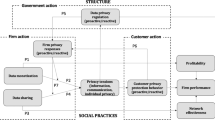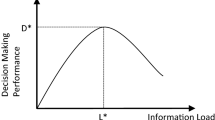Abstract
The economic distinction between technological and market information offers a useful guide to the relationship between information and policy. The two types create different problems for markets and require different emphases in public policy, focusing on either the production or the distribution of information. The interaction of the two types creates familiar policy problems such as underinvestment in information, adverse selection and moral hazard. Indicators and other means of dealing with such problems constitute policies and demonstrate not only the importance of information for policy but the necessity of policy for information.
Similar content being viewed by others
References
Akerlof, George A. (1970). The Market for ‘Lemons’: Qualitative Uncertainty and the Market Mechanism.Quarterly Journal of Economics, 84, 388–500.
Akerlof, George A. (1976). The Economics of Caste and of the Rat Race and Other Woeful Tales.Quarterly Journal of Economics, 90, 599–617.
Arrow, Kenneth J. (1962). Economic Welfare and the Allocation of Resources for Invention.The Rate and Direction of Inventive Activity: Economic and Social Factors. Universities-NBER Conference Series. Princeton: Princeton University Press, 609–25.
Arrow, Kenneth J. (1963). Uncertainty and the Welfare Economics of Medical Care.American Economic Review, 53, 941–973.
Arrow, Kenneth J. (1970). The Organization of Economic Activity: Issues Pertinent to the Choice of Market Versus Nonmarket Allocation. In Robert H. Haveman and Julius Margolis (Eds.),Public Expenditures and Policy Analysis. Chicago: Markham.
Averch, Harvey A. (1987). Applied Social Science, Policy Science and the Federal Government.Knowledge: Creation, Diffusion, Utilization, 8, 521–44.
Barber, Benjamin. (1984).Strong Democracy: Participatory Politics for a New Age. Berkeley: University of California Press.
Beal, George M., Wimal Dissanayake, Sumiye Konoshima. (Eds.). (1986).Knowledge Generation, Exchange and Utilization. Boulder: Westview Press.
Boulding, Kenneth. (1973). The Economics of the Comping Spaceship Earth. In Herman Daly (Ed.),Toward a Steady-State Economy. San Francisco: Freeman.
Campbell, Donald T. (1982). Experiments as Arguments.Kowledge: Creation, Diffusion, Utilization, 3, 327–37.
Dahlman, Carl J. (1979). The Problem of Externality.Journal of Law and Economics, 22, 141–62.
Davis, Howard R., and Susan E. Salasin. (1978). Strengthening the Contribution of Social R&D to Policy Making. Laurence E. Lynn, Jr. (Ed.),Knowledge and Policy: The Uncertain Connection. Washington, D.C.: National Academy of Sciences.
Demac, Donna A. (1988). Hearts and Minds Revisited: The Information Policies of the Reagan Administration. Vincent Mosco and Janet Wasko (Eds.),The Political Economy of Information. Madison: University of Wisconsin Press.
Dryzek, John S. (1989). Policy Sciences of Democracy.Polity, 22, 97–118.
Dunn, William N. (1982). Reforms as Arguments.Knowledge: Creation, Diffusion, Utilization, 3, 293–326.
Green, Phillip. (1981).The Pursuit of Inequality. New York: Pantheon.
Hardin, Russell. (1982).Collective Action. Baltimore: Resources for the Future.
Havelock, Ronald G. (1986). The Knowledge Perspective: Definition and Scope of a New Study Domain. In George M. Beal, Wimal Dissanayake, and Sumiye Konoshima (Eds.),Knowledge Generation, Exchange and Utilization. Boulder: Westview Press.
Hayek, Friedrich A. (1945). The Use of Knowledge in Society.American Economic Review, 35, 519–30.
Hirshleifer, J. (1971). The Private and Social Value of Information and the Reward to Inventive Activity.American Economic Review, 61, 561–74.
Hirshleifer, J., and J. G. Riley. (1979). The Analytics of Uncertainty and Information: An Expository Survey.Journal of Economic Literature, 17, 1375–1421.
Keck, Otto. (1986).The Information Dilemma: Private Information as a Cause of Transaction Failure in Markets, Regulation, Hierarchy, and Politics. Presented at Annual Meeting of The American Political Science Association, Washington, DC.
Koopmans, T. (1957).Three Essays on the State of the Economic Science. New York: McGraw-Hill.
Lynn, Laurence E., Jr. (Ed.). (1978).Knowledge and Policy: The Uncertain Connection. Washington, D.C.: National Academy of Sciences.
Machlup, Fritz. (1984).Knowledge: Its Creation, Distribution, and Economic Significance. Princeton: Princeton University Press.
Machlup, Fritz. (1962).The Production and Distribution of Knowledge in the United States. Princeton: Princeton University Press.
MacRae, Duncan, Jr. (1987). Building Policy-Related Technical Communities.Knowledge: Creation, Diffusion, Utilization, 8, 431–62.
MacRae, Duncan, Jr. (1988). Professional Knowledge for Policy Discourse: Argumentation Versus Reasoned Selection of Proposals.Knowledge in Society, 1, 6–24.
Mosco, Vincent and Janet Wasko (Eds.). (1988).The Political Economy of Information. Madison: University of Wisconsin Press.
Olson, Mancur, Jr. (1965).The Logic of Collective Action: Public Goods and the Theory of Groups. Cambridge: Harvard University Press.
Pauly, M. V. (1974). Overinsurance and Public Provision of Insurance: The Roles of Moral Hazard and Adverse Selection.Quarterly Journal of Economics, 68, 44–62.
Polanyi, Karl. (1944).The Great Transformation. New York: Rinehart and Company, Inc.
Rich, Robert F. (1981).Social Science Information and Public Policy Making. San Francisco: Jossey-Bass.
Rogers, Everett M. (1983).Diffusion of Innovations, 3rd ed. New York: The Free Press.
Rothman, Jack. (1986). The Research and Development Model of Knowledge Utilization: Process and Sturcture. In George M. Beal, Wimal Dissanayake, and Sumiye Konoshima (Eds.),Knowledge Generation, Exchange and Utilization. Boulder: Westview Press.
Rubin, Michael Rogers. (1983).Information Economics and Policy in the United States. Littleton, CO: Libraries Unlimited, Inc.
Schattschneider, E.E. (1975).The Semisovereign People: A Realist’s View of Democracy in America. New York: Dryden.
Schiller, Herbert I. and Anita R. Schiller. (1988). Libraries, Public Access to Information, and Commerce. In Vincent Mosco and Janet Wasko (Eds.),The Political Economy of Information. Madison: University of Wisconsin Press.
Schumpeter, J. (1942).Capitalism, Socialism and Democracy. New York, NY: Harper.
Simon, Herbert A. (1957).Models of Men, Social and Rational. New York: Wiley and Sons.
Spence, Michael. (1974).Market Signaling. Cambridge: Harvard University Press.
Throgmorton, J.A. (1991). The Rhetorics of Policy Analysis,Policy Sciences, 24, 153–179.
Vining, Aidan R., and David L. Weimer. (1988). Information Asymmetry Favoring Sellers: A Policy Framework.Policy Sciences, 21, 281–303.
Weiss, Carol H. (1978). Improving the Linkage Between Social Research and Public Policy. In Laurence E. Lynn, Jr. (Ed.),Knowledge and Policy: The Uncertain Connection. Washington, D.C.: National Academy of Sciences.
Weiss, Carol H. (1991). Policy Research as Advocacy: Pro and Con.Knowledge and Policy, 4, 37–55.
Williamson, Oliver E. (1975).Markets and Hierarchies, New York: Free Press.
Williamson, Oliver E. (1985).The Economic Institutions of Capitalism. The Free Press.
Zeckhauser, Richard. (1970). Uncertainty and the Need for Collective Action.Public Expenditures and Policy Analysis. Chicago: Markham, 96–116.
Author information
Authors and Affiliations
Additional information
where he is also affiliated with the Environmental Studies Center. His primary research interests are in public policy, expecially environmental policy and science and technology policy, and in the relationship between policy, economics and information.
Rights and permissions
About this article
Cite this article
Wurth, A.H. Policy information or information policy? information types in economics and policy. Knowledge and Policy 5, 65–81 (1992). https://doi.org/10.1007/BF02692776
Issue Date:
DOI: https://doi.org/10.1007/BF02692776




